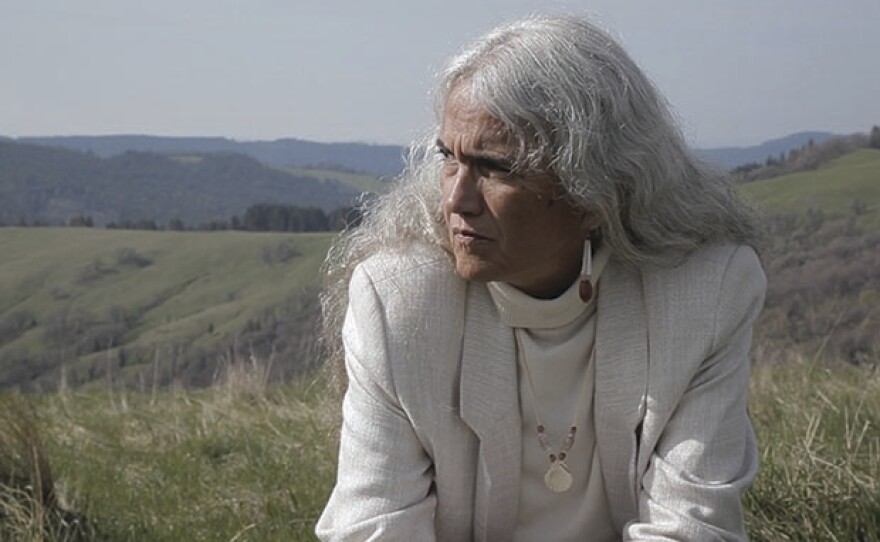—A portrait of an effective criminal justice reform movement in America—
“We are village people. We have village values. And those values compel us to take care of each other, our families and our country,” says Abby Abinanti, chief judge of the Yurok Tribal Court and the first Native American woman admitted to the State Bar of California.
"Tribal Justice" spotlights tribal courts that incorporate indigenous customs and beliefs into their justice systems.
The film follows Abby Abinanti and Claudette White, chief judges in two of the more than 300 tribal courts across the country, as they navigate cross-jurisdictional issues in their courts and communities.
"Tribal Justice" has its national broadcast premiere on the PBS documentary series POV on Monday, Aug. 21, 2017.
White is the chief judge of the Quechan Tribal Court in the Southern California desert. She says the affiliated tribe has been “vastly diminished,” but never removed from its homeland.
“We have a lot of social ills in our community based on our location and the limitation to services,” she says. “In my capacity as chief judge, what I’m fighting for is our people, our independence, our sovereignty, our existence.”
White sees Abinanti as a mentor, and both women are focused on restoring their communities rather than punishing offenders. The Yurok and Quechan tribes are the two largest in California.
Each faces its own unique issues, but Abinanti and White share the goal of increasing safety and decreasing incarceration in an effort to dismantle the school-to-prison pipeline.
Both judges are passionate about preserving their cultures and creating new pathways to justice for families dealing with historical trauma and intergenerational addiction.

“You guys could be leaders in our community or you could help destroy our community,” White tells two teenage boys in her court.
Studies show that rural areas and American Indian reservations are plagued by the manufacturing, trafficking and use of crystal methamphetamine.
Reservations are targeted by non-Native drug cartels. Native Americans have the highest meth usage of any ethnic group in the nation, resulting in extremely high crime and incarceration rates.
Abinanti remarks, “The state has a lot of responsibility for all the people. I have responsibility to one set of people — 6,000 Yuroks and their families. And that’s what I’m responsible for: for that and for this land.”

Viewers first meet Taos Proctor, a large and gregarious young man, in Abinanti’s tribal court in 2013.
While out on parole from San Quentin State Prison, Proctor was arrested with methamphetamine on his person; he is facing a third-strike conviction and 25 years to life in prison.
Over two years, the film follows Abinanti and her staff as they take on Proctor’s case and help him to complete court programs and rebuild his life.

A thousand miles to the south, White invokes the Indian Child Welfare Act of 1978 to reunite an autistic and epileptic 9-year-old boy with his family.
She also takes on a more personal case when she becomes the legal guardian to her troubled teenage nephew, Isaac Palone.
Palone has recently left a group home and faces two felony charges for breaking into cars; his case is in state court rather than tribal court, and he is at risk of beginning a life shuttling in and out of prison.
"Tribal Justice" contradicts the entrenched mainstream narrative that depicts Native Americans as locked in hopeless circumstances as their tribes vanish.
Abinanti and White’s struggles and triumphs tell a different story, one of strong female leaders working alongside their people to affirm tribal sovereignty and break free of the systems of poverty and inequality confronting Native Americans today.

Director Anne Makepeace says that she was immediately moved by the two judges upon meeting them in 2013 and felt that audiences needed to know about their work. “I realized the film would educate a broad audience about something few Americans know about — tribal courts — and that it could have a tremendous positive impact on our criminal justice system.”
“'Tribal Justice' challenges viewers to reexamine the current definition of justice in America,” says POV Executive Producer Justine Nagan. “Through the often personal experiences of two powerful women striving to elevate their people through the tribal court process, Anne Makepeace gives us the opportunity to watch a rarely seen justice system effectively at work.”
WATCH ON YOUR SCHEDULE:
This film will be available to view on demand for a limited time after broadcast.
JOIN THE CONVERSATION:
POV is on Facebook, Google +, and you can follow @povdocs on Twitter. #TribalJusticePBS
Makepeace Productions is on Facebook.
CREDITS:
Producer/Director: Anne Makepeace; Executive Producer: Ruth Cowan; Production Consultant: Jennifer Walter; Co-Producers: Daniel Golding (Quechan) and Lori Nesbit (Yurok); Cinematographer: Barney Broomfield; Editor: Russell Greene; Composer: Chris Ruggiero; Executive Producers for POV: Justine Nagan, Chris White; Executive Producer for Vision Maker Media: Shirley K. Sneve





